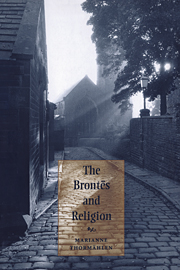Book contents
- Frontmatter
- Contents
- Acknowledgements
- Abbreviations and editions
- Introduction
- I Denominations
- Chapter 1 A Christian home in early nineteenth-century England: Evangelicalism, Dissent and the Brontë family
- Chapter 2 Charlotte Brontë and the Church of Rome
- Chapter 3 An undenominational temper
- II Doctrines
- III Ethics
- IV Clerics
- Notes
- Select bibliography
- Index
Chapter 3 - An undenominational temper
Published online by Cambridge University Press: 22 September 2009
- Frontmatter
- Contents
- Acknowledgements
- Abbreviations and editions
- Introduction
- I Denominations
- Chapter 1 A Christian home in early nineteenth-century England: Evangelicalism, Dissent and the Brontë family
- Chapter 2 Charlotte Brontë and the Church of Rome
- Chapter 3 An undenominational temper
- II Doctrines
- III Ethics
- IV Clerics
- Notes
- Select bibliography
- Index
Summary
The preceding discussion of Charlotte Brontë and the Church of Rome avoided referring to the latter as the ‘Catholic’ Church. In her time as in ours, Anglicans declare(d) their belief in ‘the holy Catholick Church’ (the Apostles' Creed) without any sense of compromising their Protestant faith. Many contemporary writers on religion emphasised the title of the Church of England to the epithet ‘Catholic’, defending it against what they saw as wrongful appropriation by the Roman Catholic Church.
Though tied to the British Isles, the Anglican Church did have some claim to the universality and all-inclusiveness implied by the term ‘Catholic’. Despite the many conflicts that agitated the Church of England in the early nineteenth century, it contained plenty of influential members who recognised and promoted the essential unity of Protestant churches. The creation of the Jerusalem Protestant bishopric in 1841 was symptomatic: representatives of King Frederick William's Lutheran Prussia and leading bishops of the Church of England jointly supported the appointment of a converted Jewish rabbi. It is possible to speak of an ecumenical movement in the 1840s in Britain, and the Brontë family was not untouched by it. The Bible and Tract Societies in which Patrick Brontë had been active from his young manhood onwards were interdenominational, and in the mid-1800s many English people shared Lucy Snowe's dreams of a ‘Holy Alliance’:
I went by turns, and indiscriminately, to the three Protestant Chapels of Villette – the French, German, and English – id est, the Presbyterian, Lutheran, Episcopalian. Such liberality argued in [Père Silas'] eyes profound indifference – who tolerates all, he reasoned, can be attached to none. Now, it happened that I had often secretly wondered at the minute and unimportant character of the differences between these three sects – at the unity and identity of their vital doctrines: I saw nothing to hinder them from being one day fused into one grand Holy Alliance, and I respected them all, though I thought that in each there were faults of form; incumbrances, and trivialities. (xxxvi.525)
- Type
- Chapter
- Information
- The Brontës and Religion , pp. 39 - 44Publisher: Cambridge University PressPrint publication year: 1999



